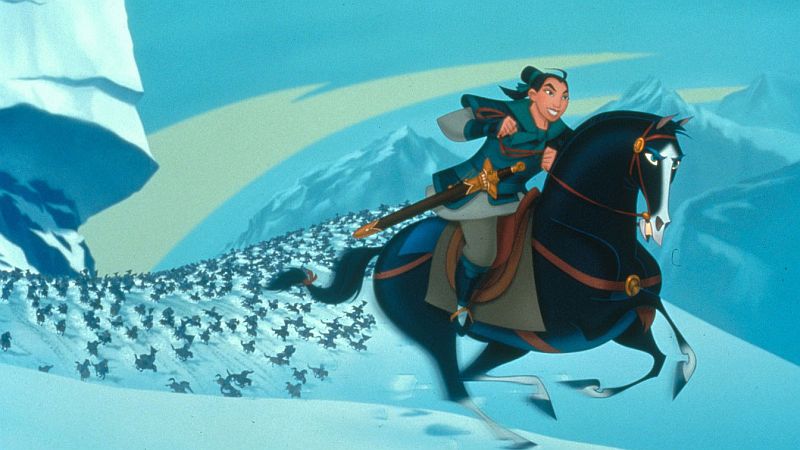 ★★★★½
★★★★½
“Here be drag-ons…”
 D
D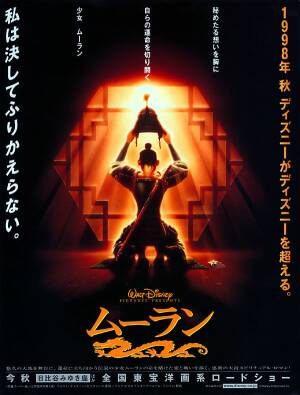 isney movies are not the usual place to find action heroines: their classic woman is a princess, who sits in a castle and waits for someone of appropriately-royal blood to come and rescue her from whatever evil fate (wicked stepmother, poisoned spinning wheel, etc.) that has befallen her.
isney movies are not the usual place to find action heroines: their classic woman is a princess, who sits in a castle and waits for someone of appropriately-royal blood to come and rescue her from whatever evil fate (wicked stepmother, poisoned spinning wheel, etc.) that has befallen her.
The first inklings of a change to this traditional attitude came in 1991 with Beauty and the Beast, where Belle was an independent-minded young lady who rejected the advances of the handsomely square-jawed hero, because he was an idiotic jerk. Unfortunately, the moral was somewhat diluted by the end when – and I trust I’m not spoiling this for anyone – the Beast turns into a rather convincing facsimile of said handsomely square-jawed hero. So, looks are everything, after all… Much more successful was their 1998 attempt, Mulan, recently released for the first time on DVD, which took a traditional Chinese legend about a girl who dresses as a man to join the army, and converted it into the traditional Disney animated feature format, complete with songs and amusing sidekick. Given the studio’s previous track record (hey, why bother paying writers to come up with new stories, when there’s public domain ones to rape?), qualms here are understandable. Perhaps most memorably, Disney gave Hans Christian Andersen’s The Little Mermaid a happy ending, though turning Quasimodo into a lovable Happy Meal probably comes close – that whirring sound you hear is Victor Hugo spinning in his grave.
And, yes, liberties were taken, though to be fair, you expect this in any screenplay – especially one whose story originally appeared in a poem written by an anonymous Chinese author around the 5th or 6th century AD. [The poem also appears on the DVD, but without any attribution or context; you’d be forgiven for thinking it was written by a Mousketeer] From here sprang a whole raft of tales, with different eras, locations or surnames, largely dependent on the author’s feelings, but having several common threads. The story takes place over more than a decade, and Mulan’s identity isn’t discovered until she has finally returned home and resumed her normal life.
 There’s also no threat of execution when her deception is found out – Chinese culture may perhaps actually have a more tolerant approach to such things, though this is admittedly going only by the likes of Peking Opera, and a good chunk of Brigitte Lin’s career. And, of course, both the romantic angle and amusing sidekick were modern additions. This contrasts sharply with one version of the original, which has the Emperor hearing of Mulan’s exploits, and demanding she becomes his concubine. Mulan commits suicide in preference to this fate, an ending that, for some reason, didn’t make it into the Disney adaptation…
There’s also no threat of execution when her deception is found out – Chinese culture may perhaps actually have a more tolerant approach to such things, though this is admittedly going only by the likes of Peking Opera, and a good chunk of Brigitte Lin’s career. And, of course, both the romantic angle and amusing sidekick were modern additions. This contrasts sharply with one version of the original, which has the Emperor hearing of Mulan’s exploits, and demanding she becomes his concubine. Mulan commits suicide in preference to this fate, an ending that, for some reason, didn’t make it into the Disney adaptation…
Perhaps the surprising thing is that there haven’t been more movie adaptations of the story – contrast the literally hundreds of movies based on Wong Fei-Hung. There have been a couple, most notably 1960’s The Lady General Hua Mu Lan, directed by Yue Fung, and starring Ling Buo as Mulan (real-life husband Jing Han played General Li). Before that was Maiden in Armor starring Nancy Chan, made in 1937, largely as propaganda to rally the Chinese against the Japanese. The most recent version was in 1999; Yang Pei-Pei’s 48 episode TV series starred Anita Yuen as Mulan [photo, right]. However, over the past couple of years, no less than three versions have been rattling around in development hell. The most eagerly anticipated one stars Michelle Yeoh as Mulan, with Chow Yun-Fat co-starring. The director is uncertain (Peter Pau and Christophe Gans are most often mentioned) and production still hasn’t started, even though it was announced back in July 2001; recent reports now have it scheduled to begin filming early next year.
Stanley Tong has also been working on The Legend of Mulan; the original plan was to shoot this in English, with Lucy Liu and The Rock as Mulan and the Hun general respectively, but this may have fallen through; with Tong now working on the next Jackie Chan film, this one seems to be on the back-burner. Finally, a Korean version, with either Jeon Ji Hyun (My Sassy Girl) or Zhang Zi-Yi, was scheduled, but not much has been heard about this lately. The Disney version, on the other hand, just came out on DVD for the first time – in part, I suspect, to act as marketing for the forthcoming, inevitable Mulan II. The trailer for the sequel is on the Mulan DVD, but Lady and the Tramp II, The Little Mermaid II, The Hunchback of Notre Dame II and Aladdin II should give you an idea of how wonderful Mulan II will be. [It’s going straight to video, of course, but it does at least have Ming-Na Wen. No Eddie Murphy though.]
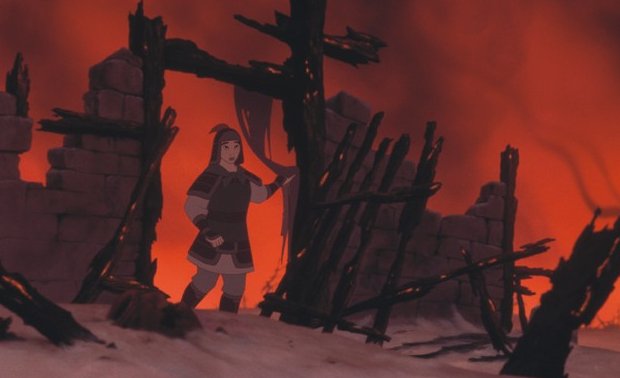 That’s a shame, because the original still has a great deal to offer. Unlike many Disney films, the songs don’t bring proceedings to a grinding halt and are notably absent from the second half of the film. Indeed, the transition is deliberately abrupt: a band of happy, singing warriors is stopped mid-verse when they come across a burnt-out village which the Huns have exterminated (right). It’s a simple, but highly effective moment, where silence says a lot more than any words. [At one point a song for Mulan about the tragedy of war was considered, but this was dropped, along with Mushu’s song, Keep ‘Em Guessing – both decisions which can only be applauded.]
That’s a shame, because the original still has a great deal to offer. Unlike many Disney films, the songs don’t bring proceedings to a grinding halt and are notably absent from the second half of the film. Indeed, the transition is deliberately abrupt: a band of happy, singing warriors is stopped mid-verse when they come across a burnt-out village which the Huns have exterminated (right). It’s a simple, but highly effective moment, where silence says a lot more than any words. [At one point a song for Mulan about the tragedy of war was considered, but this was dropped, along with Mushu’s song, Keep ‘Em Guessing – both decisions which can only be applauded.]
Obviously, in terms of action, it’s hamstrung by the G-certificate (though the British censors insisted on a headbutt being removed to get the equivalent ‘U’-rating), but allowing for this, it’s still got some exciting scenes, and the first encounter between Mulan and the Hun army is fabulous by any measure. It also avoids the pitfall of many a Disney film – making the villains more memorable than the main characters. [Everyone remembers Cruella DeVille from 101 Dalmatians; but can you name the hero?] Here, Shan-Yu is almost a caricature, but does what’s necessary quickly, allowing the other characters to be developed more completely, and compared to other Disney heroines, Mulan may be the most well-rounded human being.
Of course, Eddie Murphy comes close to stealing the show as demoted family guardian, Mushu. Unlike Shrek, where the competition for laughs with Mike Myers was painfully clear, Ming-Na Wen is content to be the straight “man”, and the film benefits as a result. Murphy’s accent is entirely anachronistic, naturally, but that’s half the fun – interestingly, the American DVD offers the option of a Mandarin soundtrack, which is a nice option. We did try it for a bit, but the Chinese Mushu just didn’t have the life and energy of Murphy, and we soon switched back. [HK singer CoCo Lee plays Mulan, while Jackie Chan is the voice of Shang in both this and the Cantonese versions] The tunes are perhaps not quite “classic” Disney, in the sense that they don’t stay in your brain for years after, to explode at the most inappropriate moments. They’re still fairly hummable though, and Jerry Goldsmith’s Eastern-tinged score compliments the similarly Oriental-flavoured animation well. The makers clearly did a lot of research, thought it does have to be said, the film does not exactly portray Chinese culture in a particularly good light; Mulan, the heroine, is shown as rebelling against it in almost every way. One reviewer describes its basic theme as, “a woman with western values overcoming the oppression of a backwards Chinese civilization.” Ouch.
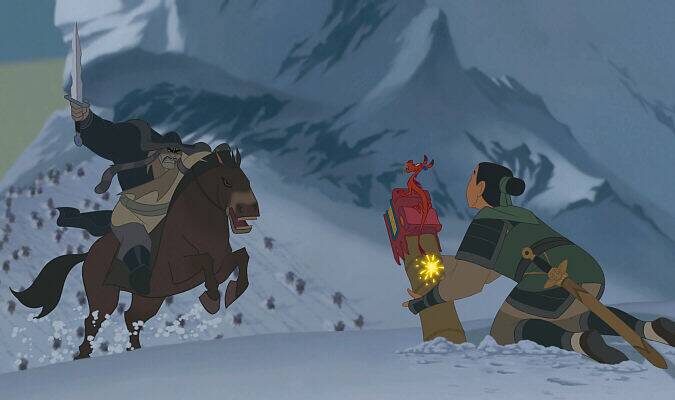 However, personally, I’d say the value of having a clearly non-Caucasian heroine (a first for any Disney film) outweighs relatively minor quibbles about subtext. It may be the last great hand-drawn animated feature from the studio which invented the genre, and all but defined it for sixty years, so I have absolutely no hesitation in recommending this as an empowering and highly entertaining tale for children – of any age, but especially those too young to read subtitles. There aren’t many action heroine films our entire family loves, but Mulan is definitely high on the list.
However, personally, I’d say the value of having a clearly non-Caucasian heroine (a first for any Disney film) outweighs relatively minor quibbles about subtext. It may be the last great hand-drawn animated feature from the studio which invented the genre, and all but defined it for sixty years, so I have absolutely no hesitation in recommending this as an empowering and highly entertaining tale for children – of any age, but especially those too young to read subtitles. There aren’t many action heroine films our entire family loves, but Mulan is definitely high on the list.
Dir: Tony Bancroft and Barry Cook
Star: Ming-na Wen, Eddie Murphy, B.D.Wong, Soon-Tek Oh
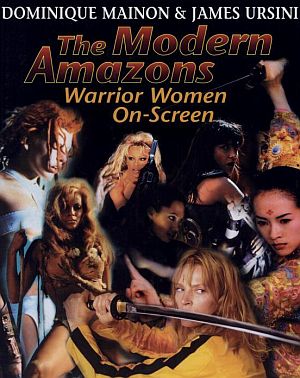 While it’s nice to see our favourite topic here getting some printed love, I can’t say I was impressed with this end result, which struggles to be all things to all women, and ends up not being very good at any of them. There’s no denying the breadth of coverage here, with everything from Sailor Moon to Ilsa getting covered – though they appear rather too willing to stretch the bounds of the term, “Amazons”. I mean: Pippi Longstocking? The coverage is grouped into various areas: monster killers, super-sleuths, fur bikinis, etc. along with additional essays on more specific themes, such as the representation of women as felines. It’s a somewhat lumpy distinction, which occasionally makes for strange bed-fellows, but occasionally comes up with some thought-provoking nuggets.
While it’s nice to see our favourite topic here getting some printed love, I can’t say I was impressed with this end result, which struggles to be all things to all women, and ends up not being very good at any of them. There’s no denying the breadth of coverage here, with everything from Sailor Moon to Ilsa getting covered – though they appear rather too willing to stretch the bounds of the term, “Amazons”. I mean: Pippi Longstocking? The coverage is grouped into various areas: monster killers, super-sleuths, fur bikinis, etc. along with additional essays on more specific themes, such as the representation of women as felines. It’s a somewhat lumpy distinction, which occasionally makes for strange bed-fellows, but occasionally comes up with some thought-provoking nuggets.




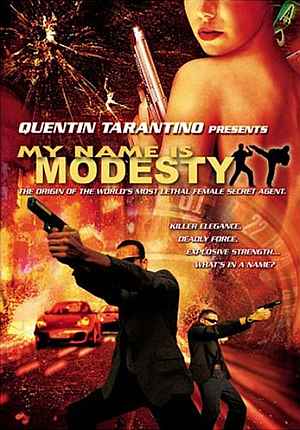 The word is, Miramax made this in order to keep their rights to the Modesty Blaise series active: I imagine a clause reverted them back to creator Peter O’Donnell, if unused within X years. Tarantino wanted to direct it, but couldn’t find the time, hence this stop-gap directed by journeyman Spiegel, who’s familiar with Quentin cast-offs, having also directed From Dusk Till Dawn 2. Shot in 18 Romanian days, the limitations of time and budget are clear [save admittedly copious flashbacks, the movie is almost all set in one location], but given them, it’s by no means a disaster. The main failing is the lack of action; we don’t see alleged jet-setting, goddess of kick-butt Blaise do much at all until the last few minutes. This may be because Staden looks as if she’d struggle to move forward in a stiff breeze; seeing her trading blows is unconvincing, and the fight choreographer should have focused on speed and/or agility instead. Though in terms of presence and steely gaze, she does fit the part well.
The word is, Miramax made this in order to keep their rights to the Modesty Blaise series active: I imagine a clause reverted them back to creator Peter O’Donnell, if unused within X years. Tarantino wanted to direct it, but couldn’t find the time, hence this stop-gap directed by journeyman Spiegel, who’s familiar with Quentin cast-offs, having also directed From Dusk Till Dawn 2. Shot in 18 Romanian days, the limitations of time and budget are clear [save admittedly copious flashbacks, the movie is almost all set in one location], but given them, it’s by no means a disaster. The main failing is the lack of action; we don’t see alleged jet-setting, goddess of kick-butt Blaise do much at all until the last few minutes. This may be because Staden looks as if she’d struggle to move forward in a stiff breeze; seeing her trading blows is unconvincing, and the fight choreographer should have focused on speed and/or agility instead. Though in terms of presence and steely gaze, she does fit the part well.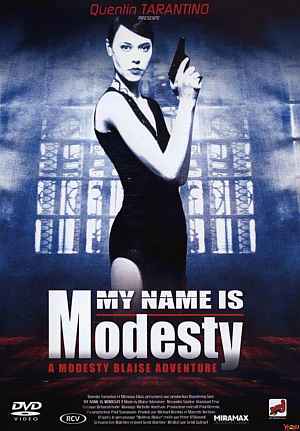 I remember the books from my youth, and the huge disappointment I felt when I saw the 1966 camp abortion starring Monica Vitti [there was also an 1982 TV pilot, with Ann Turkel, which I haven’t found]. This “origin” story is an improvement, at least taking the characters seriously. Blaise is trapped in a casino by a robber with a grudge against the owner (Waldau), and as they wait for the guy with the safe combination to arrive, she trades stories of her past for the freedom of the other hostages, Arabian Nights style, almost. I’d be somewhat curious to see the original cut, which apparently ran nearly two hours. Now, it’s barely 70 minutes between Bond-esque opening and closing credits, yet is still pretty talky, Blaise and her mentor (Pearson) meandering between the Balkans and Morocco.
I remember the books from my youth, and the huge disappointment I felt when I saw the 1966 camp abortion starring Monica Vitti [there was also an 1982 TV pilot, with Ann Turkel, which I haven’t found]. This “origin” story is an improvement, at least taking the characters seriously. Blaise is trapped in a casino by a robber with a grudge against the owner (Waldau), and as they wait for the guy with the safe combination to arrive, she trades stories of her past for the freedom of the other hostages, Arabian Nights style, almost. I’d be somewhat curious to see the original cut, which apparently ran nearly two hours. Now, it’s barely 70 minutes between Bond-esque opening and closing credits, yet is still pretty talky, Blaise and her mentor (Pearson) meandering between the Balkans and Morocco.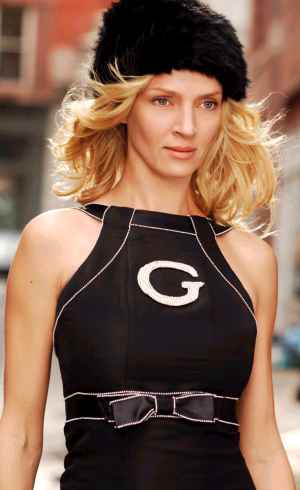 There’s certainly plenty of potential in the idea: how do you break up with your girlfriend, when she’s not just needy and possessive, but also has superhuman strength, the ability to fly and can boil your fishtank with her gaze? And the casting is, in general, excellent, too. Matt (Wilson) is an endearing everyman, and Thurman is perfect for capturing the mix of neuroses and power in G-Girl – her sequence where she pouts and refuses to save New York from a rogue missile is great. Izzard, naturally, steals almost every scene as supervillain Professor Bedlam [or “Barry”, as G-Girl knows him], though Riann Wilson matches him as Matt’s best friend, who talks a far better sexual game than he actually plays.
There’s certainly plenty of potential in the idea: how do you break up with your girlfriend, when she’s not just needy and possessive, but also has superhuman strength, the ability to fly and can boil your fishtank with her gaze? And the casting is, in general, excellent, too. Matt (Wilson) is an endearing everyman, and Thurman is perfect for capturing the mix of neuroses and power in G-Girl – her sequence where she pouts and refuses to save New York from a rogue missile is great. Izzard, naturally, steals almost every scene as supervillain Professor Bedlam [or “Barry”, as G-Girl knows him], though Riann Wilson matches him as Matt’s best friend, who talks a far better sexual game than he actually plays.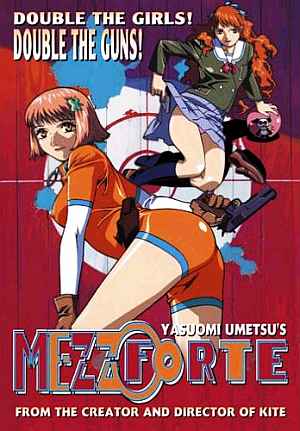 The Peach Twisters baseball team suck. This may be because the owner kills his pitcher with a baseball bat in the car-park, after losing a game? And he’s the model of restraint and sanity compared to his daughter, Momomi. The Danger Service Agency, a trio of troubleshooters, are hired to kidnap the owner (obviously, legality is a minor concern), but things go wrong, and he dies in the process. How can they escape this tricky situation? The core of the DSA is Mikura, who is a combat specialist, and easily the best thing in the group, as the other two are largely forgettable. But when Mikura goes into action, the film accelerates from 0-60 in about two seconds, which a cheerful, splattery approach that’s endearing. And she’s an upbeat character, which is a notable contrast to Umetsu’s other genre entry, Kite [Sawa, that show’s heroine, makes a cameo here].
The Peach Twisters baseball team suck. This may be because the owner kills his pitcher with a baseball bat in the car-park, after losing a game? And he’s the model of restraint and sanity compared to his daughter, Momomi. The Danger Service Agency, a trio of troubleshooters, are hired to kidnap the owner (obviously, legality is a minor concern), but things go wrong, and he dies in the process. How can they escape this tricky situation? The core of the DSA is Mikura, who is a combat specialist, and easily the best thing in the group, as the other two are largely forgettable. But when Mikura goes into action, the film accelerates from 0-60 in about two seconds, which a cheerful, splattery approach that’s endearing. And she’s an upbeat character, which is a notable contrast to Umetsu’s other genre entry, Kite [Sawa, that show’s heroine, makes a cameo here].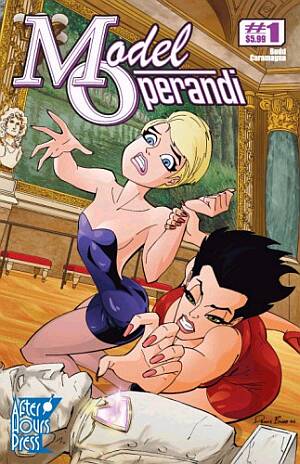
 Back in the day, I was a big comics fan, but have largely ignored the medium since coming to America in 2000 [there are still two large, unopened boxes in the hallway closet!] I think it’s perhaps the Scot in me coming out: graphic novels are an expensive way to pass an hour or so. Props first, therefore, to Caramagna and Budd, for keeping the cost of their first issue to an extremely reasonable price The story therein centers on the theft in France of a priceless diamond, the Heart of Josephine, and the quest of supermodel Legsy Diamond and Ann Lezbee, the implausibly-bosomed Special Ops Presidential Intern, to retrieve it.
Back in the day, I was a big comics fan, but have largely ignored the medium since coming to America in 2000 [there are still two large, unopened boxes in the hallway closet!] I think it’s perhaps the Scot in me coming out: graphic novels are an expensive way to pass an hour or so. Props first, therefore, to Caramagna and Budd, for keeping the cost of their first issue to an extremely reasonable price The story therein centers on the theft in France of a priceless diamond, the Heart of Josephine, and the quest of supermodel Legsy Diamond and Ann Lezbee, the implausibly-bosomed Special Ops Presidential Intern, to retrieve it.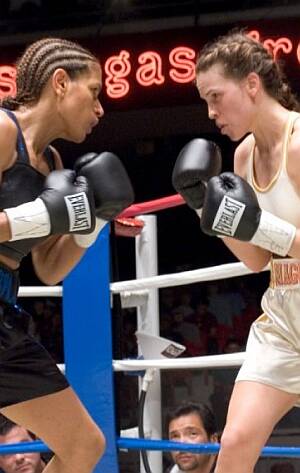 The problem with boxing films is that it’s very hard to avoid the obvious cliches. Kid from the streets, initially seen as hopeless, eventually convinces a trainer to take them on, and struggles towards the goal of a shot at the big time. Million is no different, for the first two-thirds at least. Then, there is a sudden, unexpected swerve – or would have been unexpected, if our son hadn’t ruthlessly spoilered it, by wandering in and telling us of a scene in Scary Movie 4 which spoofed it. Thank you, Robert. :-) This shifts the movie in a radically different direction, though also divorcing it entirely from the action heroine genre and robbing it of at least half a grade, since reviews here center around such aspects.
The problem with boxing films is that it’s very hard to avoid the obvious cliches. Kid from the streets, initially seen as hopeless, eventually convinces a trainer to take them on, and struggles towards the goal of a shot at the big time. Million is no different, for the first two-thirds at least. Then, there is a sudden, unexpected swerve – or would have been unexpected, if our son hadn’t ruthlessly spoilered it, by wandering in and telling us of a scene in Scary Movie 4 which spoofed it. Thank you, Robert. :-) This shifts the movie in a radically different direction, though also divorcing it entirely from the action heroine genre and robbing it of at least half a grade, since reviews here center around such aspects. Just imagine Jennifer Aniston watching this film: every time Ange appears on the screen, or gazes lovingly at Brad, Jen shrieks maniacally, “Die, sluuuuuut!” Such thoughts will keep you entertained during the sluggish first hour – you’ll need them, while you wait for the characters to realise what we know from the start: Mr. and Mrs. Smith are both assassins, now targeted by their respective agencies. For
Just imagine Jennifer Aniston watching this film: every time Ange appears on the screen, or gazes lovingly at Brad, Jen shrieks maniacally, “Die, sluuuuuut!” Such thoughts will keep you entertained during the sluggish first hour – you’ll need them, while you wait for the characters to realise what we know from the start: Mr. and Mrs. Smith are both assassins, now targeted by their respective agencies. For 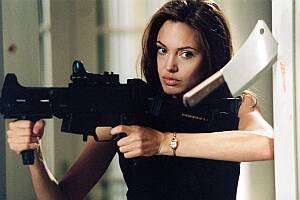 We don’t know whether the Smiths are “good”, “bad” or independent contractors, an interesting approach (we have no moral compass beyond their actions), yet disappointing. For another weakness is that the villains are merely faceless minions, when the genre needs a Big Bad for the climax – the obvious one here is the people that ordered the terminations. Liman, whose Bourne Identity was also about a killer with a contract on his head, might appreciate this more than most, and word is two such endings were shot, just not used. Still, I suspect that the sequel – likely inevitable, given this was one of 2005’s top ten at the US box-office – could very well be more fun than the original. At least we’ll have all the tedious set-up out of the way.
We don’t know whether the Smiths are “good”, “bad” or independent contractors, an interesting approach (we have no moral compass beyond their actions), yet disappointing. For another weakness is that the villains are merely faceless minions, when the genre needs a Big Bad for the climax – the obvious one here is the people that ordered the terminations. Liman, whose Bourne Identity was also about a killer with a contract on his head, might appreciate this more than most, and word is two such endings were shot, just not used. Still, I suspect that the sequel – likely inevitable, given this was one of 2005’s top ten at the US box-office – could very well be more fun than the original. At least we’ll have all the tedious set-up out of the way.
 isney movies are not the usual place to find action heroines: their classic woman is a princess, who sits in a castle and waits for someone of appropriately-royal blood to come and rescue her from whatever evil fate (wicked stepmother, poisoned spinning wheel, etc.) that has befallen her.
isney movies are not the usual place to find action heroines: their classic woman is a princess, who sits in a castle and waits for someone of appropriately-royal blood to come and rescue her from whatever evil fate (wicked stepmother, poisoned spinning wheel, etc.) that has befallen her. There’s also no threat of execution when her deception is found out – Chinese culture may perhaps actually have a more tolerant approach to such things, though this is admittedly going only by the likes of Peking Opera, and a good chunk of Brigitte Lin’s career. And, of course, both the romantic angle and amusing sidekick were modern additions. This contrasts sharply with one version of the original, which has the Emperor hearing of Mulan’s exploits, and demanding she becomes his concubine. Mulan commits suicide in preference to this fate, an ending that, for some reason, didn’t make it into the Disney adaptation…
There’s also no threat of execution when her deception is found out – Chinese culture may perhaps actually have a more tolerant approach to such things, though this is admittedly going only by the likes of Peking Opera, and a good chunk of Brigitte Lin’s career. And, of course, both the romantic angle and amusing sidekick were modern additions. This contrasts sharply with one version of the original, which has the Emperor hearing of Mulan’s exploits, and demanding she becomes his concubine. Mulan commits suicide in preference to this fate, an ending that, for some reason, didn’t make it into the Disney adaptation… That’s a shame, because the original still has a great deal to offer. Unlike many Disney films, the songs don’t bring proceedings to a grinding halt and are notably absent from the second half of the film. Indeed, the transition is deliberately abrupt: a band of happy, singing warriors is stopped mid-verse when they come across a burnt-out village which the Huns have exterminated (right). It’s a simple, but highly effective moment, where silence says a lot more than any words. [At one point a song for Mulan about the tragedy of war was considered, but this was dropped, along with Mushu’s song, Keep ‘Em Guessing – both decisions which can only be applauded.]
That’s a shame, because the original still has a great deal to offer. Unlike many Disney films, the songs don’t bring proceedings to a grinding halt and are notably absent from the second half of the film. Indeed, the transition is deliberately abrupt: a band of happy, singing warriors is stopped mid-verse when they come across a burnt-out village which the Huns have exterminated (right). It’s a simple, but highly effective moment, where silence says a lot more than any words. [At one point a song for Mulan about the tragedy of war was considered, but this was dropped, along with Mushu’s song, Keep ‘Em Guessing – both decisions which can only be applauded.] However, personally, I’d say the value of having a clearly non-Caucasian heroine (a first for any Disney film) outweighs relatively minor quibbles about subtext. It may be the last great hand-drawn animated feature from the studio which invented the genre, and all but defined it for sixty years, so I have absolutely no hesitation in recommending this as an empowering and highly entertaining tale for children – of any age, but especially those too young to read subtitles. There aren’t many action heroine films our entire family loves, but Mulan is definitely high on the list.
However, personally, I’d say the value of having a clearly non-Caucasian heroine (a first for any Disney film) outweighs relatively minor quibbles about subtext. It may be the last great hand-drawn animated feature from the studio which invented the genre, and all but defined it for sixty years, so I have absolutely no hesitation in recommending this as an empowering and highly entertaining tale for children – of any age, but especially those too young to read subtitles. There aren’t many action heroine films our entire family loves, but Mulan is definitely high on the list. Everyone’s favourite scissor-wielding mobsteress Cha Eun Jin (Shin) is back, in a follow up to one of the biggest hits in recent Korean cinema. Starting with a rooftop brawl set to White Christmas, there’s no hanging around here: Eun Jin falls from the roof, loses her memory, and we leap forward two years. She is now living with a restaurant owner (Park), and regularly resorts to desperate measures, usually involving electricity, to remember who she is. However, as her foes first time round have plans to build a mall in the area, and her step-daughter is getting bullied at school, no prizes for guessing that memory’s gonna be jogged, sooner or later…
Everyone’s favourite scissor-wielding mobsteress Cha Eun Jin (Shin) is back, in a follow up to one of the biggest hits in recent Korean cinema. Starting with a rooftop brawl set to White Christmas, there’s no hanging around here: Eun Jin falls from the roof, loses her memory, and we leap forward two years. She is now living with a restaurant owner (Park), and regularly resorts to desperate measures, usually involving electricity, to remember who she is. However, as her foes first time round have plans to build a mall in the area, and her step-daughter is getting bullied at school, no prizes for guessing that memory’s gonna be jogged, sooner or later…